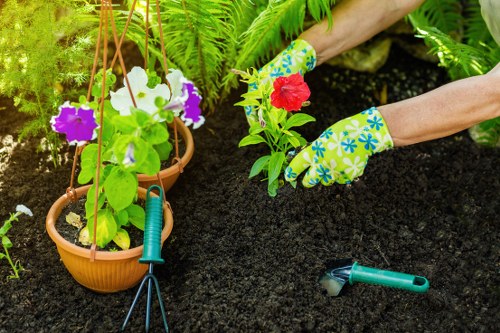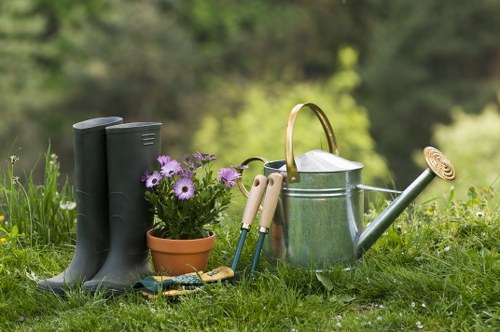Expert Gardener Services in Lawn Turf Installation
Introduction to Lawn Turf Installation

Creating a lush, green lawn is a dream for many homeowners, and professional gardeners play a crucial role in turning that dream into reality. Lawn turf installation involves meticulous planning, preparation, and execution to ensure a healthy and aesthetically pleasing lawn.
Whether you're starting from scratch or renovating an existing lawn, understanding the process and selecting the right gardener can make all the difference. In this article, we'll explore the essential aspects of lawn turf installation and how expert gardeners can help you achieve the perfect outdoor space.
From soil preparation to selecting the best turf varieties, our comprehensive guide covers everything you need to know about lawn turf installation. Let's delve into the details.
Benefits of Professional Lawn Turf Installation

Opting for professional lawn turf installation offers numerous advantages over DIY methods. Here are some key benefits:
- Expertise: Professional gardeners have the knowledge and experience to handle various challenges that may arise during installation.
- Time-Saving: Hiring experts allows you to save time and effort, ensuring the project is completed efficiently.
- Quality Materials: Professionals use high-quality turf and materials, resulting in a healthier and more durable lawn.
- Proper Installation Techniques: Ensuring correct installation methods helps in achieving optimal growth and longevity of the turf.
- Maintenance Tips: Experts provide valuable advice on maintaining your new lawn, ensuring it remains green and vibrant.
Choosing the Right Turf Variety

Selecting the appropriate turf variety is essential for creating a lawn that complements your climate, soil type, and usage preferences. Here are some popular turf options:
- Fescue: Ideal for cooler climates, fescue offers a dense, dark green lawn with good shade tolerance.
- Bermuda Grass: Perfect for warmer regions, Bermuda grass thrives under full sun and is highly drought-resistant.
- Kentucky Bluegrass: Known for its rich color and fine texture, this grass type is suited for areas with ample sunlight and regular maintenance.
- St. Augustine Grass: Suitable for coastal areas, St. Augustine grass has a coarse texture and maintains its color well in humid conditions.
- Zoysia Grass: A versatile option, Zoysia grass is durable and can withstand heavy foot traffic, making it ideal for active lawns.
Soil Preparation for Optimal Turf Growth

Proper soil preparation is the foundation of a successful lawn turf installation. Here are the key steps involved:
Testing Soil Quality
Before installation, it's crucial to test your soil's pH level and nutrient content. This helps in determining any necessary amendments to create a fertile environment for the turf.
Clearing the Area
Remove any existing vegetation, rocks, and debris from the installation site. This ensures a smooth and even surface for laying the turf.
Amending the Soil
Add organic matter, such as compost or aged manure, to improve soil structure and drainage. Incorporating fertilizers can also provide essential nutrients for healthy turf growth.
Installation Techniques for a Seamless Lawn

Professional gardeners employ specific techniques to ensure a seamless and long-lasting lawn. Here's an overview of the installation process:
Grading and Leveling
Ensure the soil is properly graded to facilitate water drainage and prevent pooling. Leveling the area creates a uniform surface for laying the turf.
Turf Laying
Begin laying the turf at the longest straight edge, such as a driveway or sidewalk. Lay the rolls tightly together, staggering the seams like bricks to prevent gaps and ensure a strong foundation.
Watering and Rolling
After installation, water the turf thoroughly to help the roots establish. Use a roller to press the turf firmly into the soil, eliminating air pockets and ensuring good contact between the roots and the soil.
Post-Installation Care and Maintenance
Maintaining your newly installed lawn turf is essential for its longevity and vibrancy. Follow these maintenance tips:
- Regular Watering: Ensure your lawn receives adequate water, especially during the first few weeks after installation.
- Mowing: Mow the grass regularly to maintain the desired height and encourage dense growth.
- Fertilizing: Apply fertilizers as recommended by your gardener to provide necessary nutrients.
- Pest Management: Monitor your lawn for pests and diseases, addressing any issues promptly.
- Aeration: Periodically aerate the soil to improve air and water circulation to the roots.
Common Challenges in Lawn Turf Installation
Despite careful planning, several challenges can arise during lawn turf installation. Here's how professional gardeners address them:
Improper Soil Preparation
Neglecting soil preparation can lead to poor turf growth. Experts ensure the soil is well-prepared, enhancing nutrient availability and drainage.
Uneven Terrain
Uneven ground can result in an unattractive lawn and water pooling. Professional graders level the soil, creating a smooth surface.
Pest Infestations
Pests can damage the new turf before it establishes. Gardeners implement preventive measures and treatments to protect your lawn.
Selecting a Professional Gardener for Your Lawn Turf Installation
Choosing the right gardener is crucial for a successful lawn installation. Consider the following factors:
- Experience: Look for gardeners with extensive experience in lawn turf installation and positive customer reviews.
- Certifications: Ensure the gardener has relevant certifications and adheres to industry standards.
- Portfolio: Review their portfolio to assess the quality and style of their previous projects.
- Services Offered: Choose gardeners who offer comprehensive services, including soil testing, turf selection, installation, and maintenance.
- Cost: Obtain quotes from multiple gardeners to compare pricing and ensure you receive value for your investment.
Innovative Techniques in Modern Lawn Turf Installation
Advancements in gardening have introduced innovative techniques for lawn turf installation, enhancing efficiency and results:
Lawn Reinforcement
Using reinforcement mesh or geotextiles can provide additional support to the turf, preventing tearing and promoting even growth.
Smart Irrigation Systems
Integrating smart irrigation systems ensures efficient water usage, automatically adjusting based on weather conditions and soil moisture levels.
Eco-Friendly Practices
Many gardeners now adopt sustainable practices, such as using organic fertilizers and reducing chemical pesticide use, to create environmentally friendly lawns.
Cost Considerations in Lawn Turf Installation
Understanding the costs involved in lawn turf installation helps in budgeting and decision-making:
- Material Costs: The price of turf varies based on type, quality, and supplier.
- Labor Costs: Professional installation fees depend on the size of the area and the complexity of the project.
- Soil Amendments: Additional costs may arise from soil testing, fertilizers, and other amendments required for optimal growth.
- Maintenance Expenses: Ongoing maintenance, such as watering, mowing, and fertilizing, should be factored into your budget.
- Optional Enhancements: Features like irrigation systems or lawn reinforcement can add to the overall cost.
Budget-Friendly Tips
To manage costs effectively, consider the following tips:
- Plan Ahead: Detailed planning can prevent unexpected expenses during installation.
- Compare Quotes: Obtain multiple quotes to find competitive pricing without compromising quality.
- DIY Maintenance: Handle routine maintenance tasks yourself to reduce ongoing costs.
Environmental Impact of Lawn Turf Installation
While lawns enhance the beauty of your property, it's important to consider their environmental impact:
Water Consumption
Lawns can be water-intensive. Opt for drought-resistant turf varieties and efficient irrigation systems to minimize water usage.
Chemical Use
Excessive use of fertilizers and pesticides can harm the environment. Choose organic alternatives and implement integrated pest management practices.
Biodiversity
Lawns can support local biodiversity when managed sustainably. Incorporate native plants and avoid monocultures to encourage beneficial insects and wildlife.
Long-Term Benefits of a Well-Installed Lawn
A professionally installed lawn offers lasting benefits that enhance your home's value and your quality of life:
- Enhanced Curb Appeal: A green, healthy lawn improves the aesthetic appeal of your property.
- Increased Property Value: Well-maintained lawns can boost the resale value of your home.
- Recreational Space: A spacious lawn provides an area for outdoor activities and relaxation.
- Environmental Benefits: Lawns contribute to air purification, carbon sequestration, and soil health.
- Stress Reduction: Green spaces have been shown to reduce stress and promote mental well-being.
Year-Round Beauty
With proper care, your lawn remains vibrant and attractive throughout the year, adding lasting beauty to your landscape.
Conclusion: Transform Your Outdoor Space Today
Investing in professional lawn turf installation is a smart decision for achieving a beautiful and sustainable lawn. From selecting the right turf variety to meticulous installation and maintenance, expert gardeners ensure your outdoor space thrives.
Ready to transform your lawn into a green haven? Contact us today to schedule a consultation and take the first step toward your dream lawn.
Don't wait any longer—book your service now and enjoy the benefits of a professionally installed lawn.